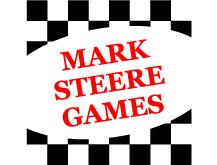
| HOME | ABSTRACT GAMES | CONNECTION GAMES | GAME INDEX |
| THOUGHTS | My thoughts on abstract games. |
| FRACTAL IMAGES BY LUIS BOLANOS MURES |
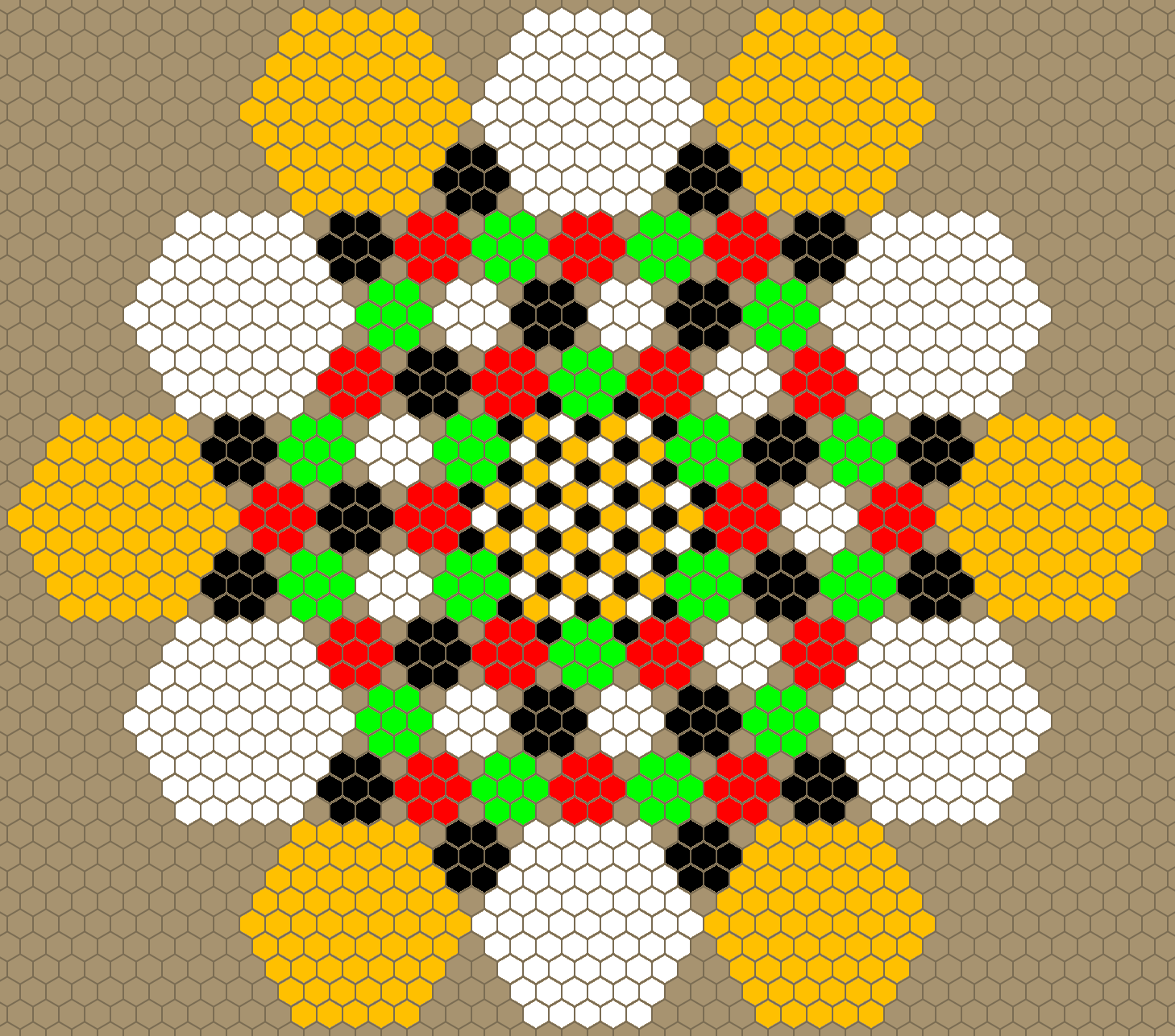
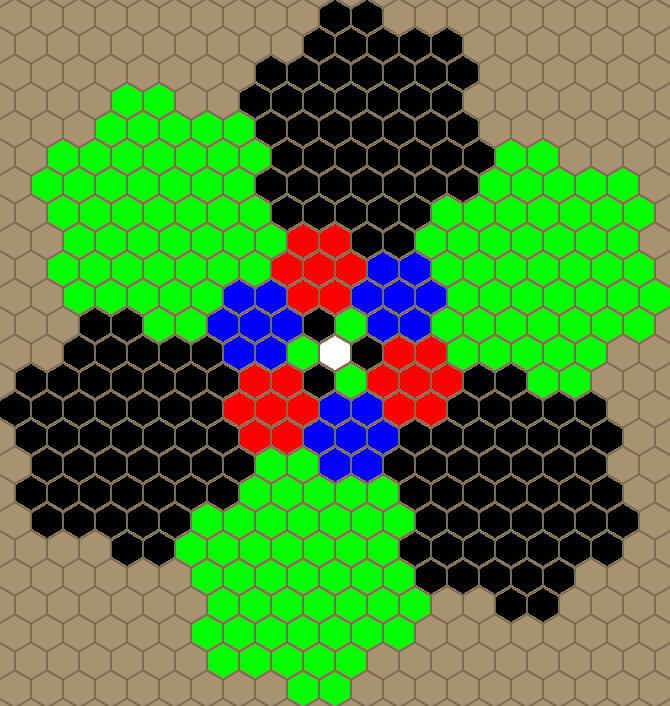
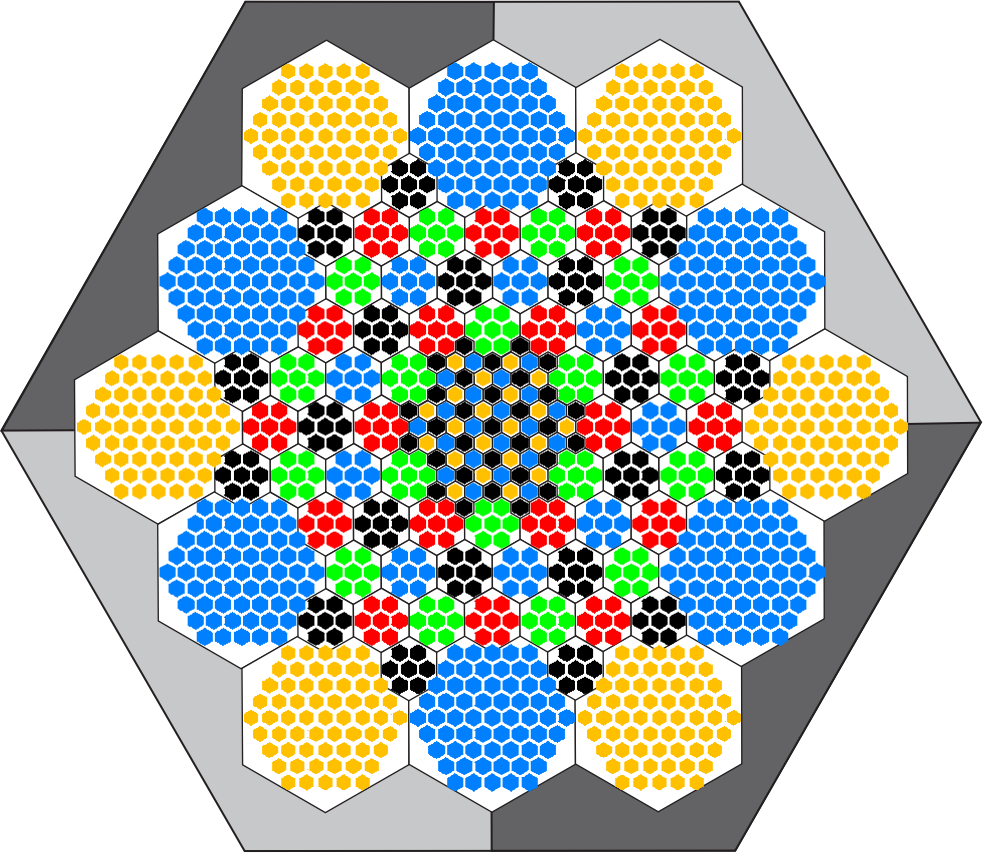
|
| RIVE AND OUST ON BGA |
Rive is in beta on Board Game Arena. Just finished my Oust program. Waiting for management to put it into alpha. Christ that was a hard program. Now doing the graphics for Cephalopod. After my Oust programming ordeal, I have a new appreciation for programmers. They're still way lower on the totem pole than designers, but not quite the shit kickers I've described them as in the past. Programming can be difficult, depending on the game. Programming a server must be that much more challenging. I'm a long way from being a professional programmer. I didn't need any help on my last three game programs, but I'm barely treading water. So my hat is off to real programmers - my designer hat with the tiny programmer fishing fly hooked into the band. |
| SILO FINITUDE PROOF |
Jonathan Baker, mathematician at Virginia Tech, has written a proof of Silo finitude. Let this be inspiration to all you mathematicians who want to prove my games finite, but are too busy trying to prove Fermat's last theorem. Btw, you KNOW Fermat had a head smacking simple proof. His only miscalculation was overestimating the analytical ability of the rest of humanity for generations to come. BONUS: Jonathan (BABAMOTS) will be programming Impasse for Board Game Arena. What a guy :) |
| TORCH BEARER |
I think of Michael Amundsen as the torch bearer in this thin sliver of the design universe we've found ourselves in. Not that he's the most qualified. Just that he's qualified. Michael consistently innovates in an uncommonly creative manner. Not Game X "with a twist." There are tenderfoots, but no one else I would recognize as the torch bearer. Actually, Alek Erickson deserves mention. He collaborated with Michael on many of his designs. |
| CLASSES OF GAMES |
An Oust class game is a naturally finite game (no ko required) that starts with an empty board, is played with two colors of stones, and ends with only one color of stones on the board. The only games I know of in this class are Oust and Corey Clark's Faust. [Corey said he named his game to rhyme with Oust, but then later denied it and renamed his game to something else, I don't remember what. He made minor changes to the rules like 15 times, resulting in a game that was he claimed was superior to Oust, based on imaginary issues with Oust that Faust doesn't have. Corey challenged me to a game of Oust in which he would move first, to prove his point. After he lost, he disappeared from the internet, never to be heard from again, except in his own forum where he deletes posts he doesn't agree with. Needless to say, it's pretty much only him in his forum.] The Redstone class is slightly more inclusive than the Oust class. Redstone is a naturally finite game that starts with an empty board, is played with black, white, and red (neutral) stones and ends with red and black, red and white, or just red stones on the board. It's a murder suicide game and the last move could clear the board of all black and white stones, in which case the perpetrator wins. Rive seems to be in a class of its own. Michael Amundsen said of Rive, "There are no other proper territory games that feature only placement and removal captures, and are naturally finite and naturally drawless, than Rive." Rive is a very interesting game. The churn rate is so massive that it has to be played on a tiny board. On a normal board, play would go on for days. Unfortunately, no programmers have deemed Rive worthy of programming, but it's a classic MSG game. |
| MANGO TOWN |
Mango Town is a YouTube channel with a couple of guys (Mango Town Travis and Mango Town Matt) who demo games. They've added a sub-list of MSG games. They also have a discord chat. Stop in and say Hi. Mango Town YouTube Mango Town Chat (Fruit Municipality Federation) |
| LIFELINE |
I'm liking Lifeline by Michael Amundsen and Luis Bolaņos Mures. It's one of those rare "I wish I'd thought of it" games. I like their other games too, but none of them quite rose to said stratospheric standard before. Out of the gate, it wasn't clear whether it should be an elimination game or a stalemate game. Sometimes it's a fine distinction. It went back and forth a couple times and was play tested and studied. Finally... it's most natural expression is stalemate. In any case, it seems like a masterpiece to me. The concept of separating like colored groups off from each other was a tour de force. Congratulations to Michael and Luis. |
| FIVE MUSKETEERS DATA |
On Board Game Arena, the initial surges of the first four MSG games were like rogue waves. They peaked high and dropped off after a few days. Icebreaker's surge is more like a tsunami. It's been online almost a month and it's barely slowed down. Dodo is my next most popular game at BGA, though a distant second to Icebreaker. First 7 days of February, 2022: 
Looks like I hit the jackpot with Icebreaker. Good thing I decided to design and program a fifth musketeer. .01% of audience share may not seem like a "jackpot", but compared to other new, unmarketed games, it is. |
| LARIAT BOARD |
Michael Amundsen has created a board for Lariat to replace the split cylinder board on the rule sheet. His board is isomorphic to the original, including the 5 sided cells on the cylinder corners. 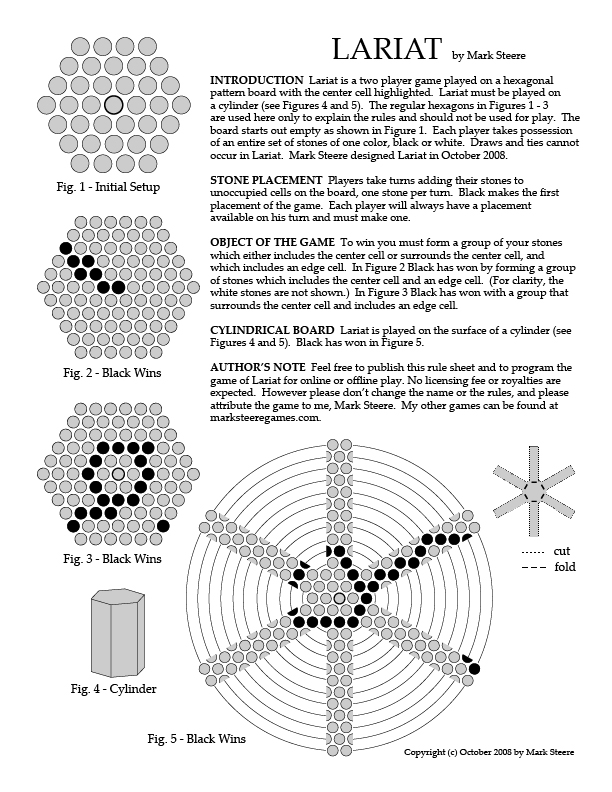
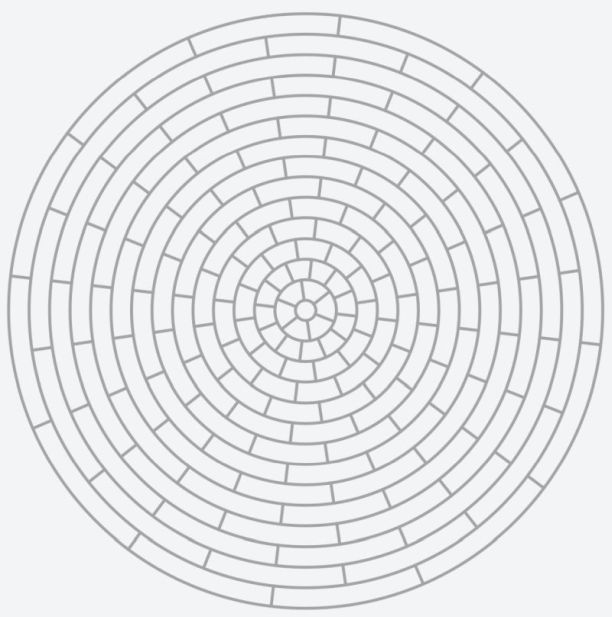
|
| FIVE MUSKETEERS AT BGA |
Here is a comparison of the five musketeers' performance at Board Game Arena during the past year as of February 1, 2022. GOPHER - graph height 600 
DODO - graph height 600 
SILO - graph height 200 
ZOLA - graph height 90 
ICEBREAKER - graph height 200 
The remarkable thing about Icebreaker's initial surge is not its height but its fatness. Of the five musketeers, Icebreaker seems to be outperforming the others. It's holding fairly steady. No precipitous dropoff so far. Let's see what February has in store. Player enthusiasm for Icebreaker is through the roof, based on the compliments I've been receiving. And I think I may know why. Icebreaker engages all of the elements of greed. Collecting, hoarding, fending off, guarding, outwitting, consuming. In the end you're rewarded for being a more gluttonous consumer. Maybe it would have been better to have leprechauns collecting pots of cold instead of ships knocking out chunks of ice. But I don't think the perceived value of what's being collected matters. It's just the instinctive struggle to get more than the other guy, whatever it is you're getting. Icebreaker has full bodied strategy and distinct tactics. I read an article by Christian Freeling about clarity (Abstract Games Magazine, Issue 22) and I came away from it understanding less about clarity than before. The article itself was a lesson in non-clarity. But whatever clarity is, I think Icebreaker must have it, in abundance. Now, all that being said, what's my favorite game? It's a three way tie between Icebreaker, Dodo, and Zola. You've heard the expression, It's not whether you win or lose; it's how you play the game. That may be true for Icebreaker and Zola. But for Dodo a more fitting expression would be, Winning isn't everything; it's the only thing. Somehow Dodo is more tense, especially leading up to the bitter end. Winning at Dodo is extra satisfiing, and losing just plain sucks. Dodo and Zola are outstanding games. Icebreaker may be better in it's own way but not overall. I can see why it would be popular though. |
| BOARD AND TABLE |
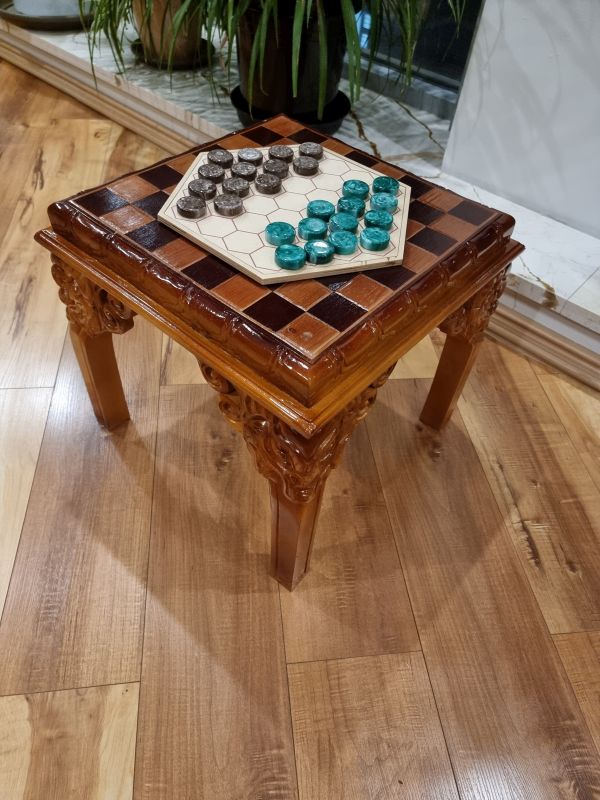
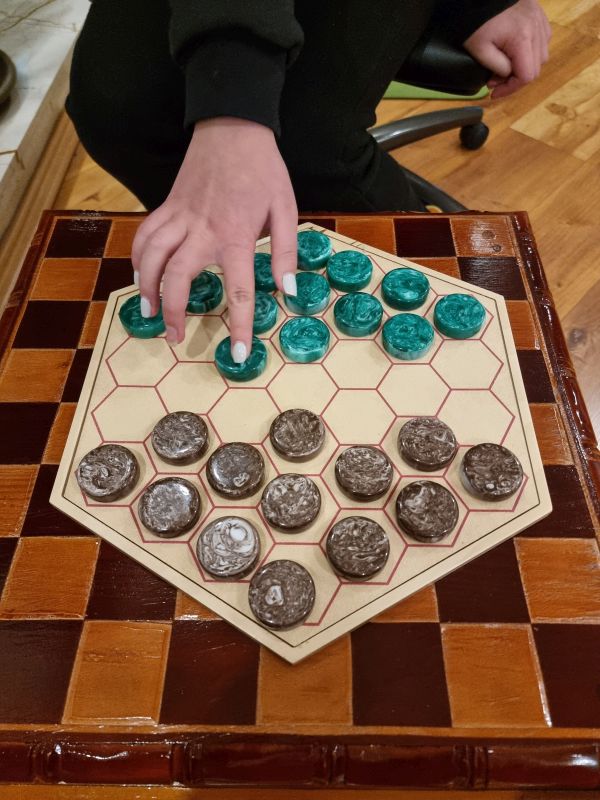
Lovely Dodo board and checkers, both made by Crisloid. Inlaid suede material. Mongolian Chess table. Made by Mongolian guy to my specifications. |
| ICEBREAKER ON BGA |
Icebreaker is now in alpha on Board Game Arena. Dijkstra's algorithm's bark was bigger than its bite. Fairly straightforward. It made for a complicated program function though. Like twenty nested levels. There were a few nasty bugs that were hard to track down. But it seems to be in order now. It's an elegant, ingenious algorithm, and my program reflects that, if I may say so. I'm really liking Icebreaker. I had my "four musketeers" (simple games Gopher, Dodo, Silo, and Zola). But I just wanted a fifth one before I go on to my next project (programming for cellphones). I concentrated hard for a few weeks, ran into a lot of dead ends, then some of the dead ends combined to form a live end. Icebreaker is my second two player game with three colors. Redstone also has red, black, and white. I like how Icebreaker gameplay can unfold in a million billion different ways. The game tree must be astronomical. Someone said Icebreaker doesn't have the tension of my other games, and they're probably right. But not every game has to be a tension fest. I read somewhere that the biggest market in games is "hyper casual". Not really sure what that means. Sounds like an oxymoron. But whatever it is, Icebreaker probably fits the description. Let's wait and see. I always like my most recent game best, but I'm still interested in the four before Icebreaker. Actually, I think I'm about done with Silo. It's still something to behold. Magnificent architecture. But it's frustrating to play. Some people get it. I'm not one of them. Dodo is always good. Gopher is fine now and again. Zola is the only hard to learn game of the five musketeers. People were having trouble with the concept of Closer to (and Farther from) center. I don't know how to explain it any more clearly than I already did. If you moved a checker, and it's now farther from center than it was, then you moved it farther from center. I never imagined this would be such an obstacle. But... Zola is my most popular game on BGA. So I guess my theory of simplicity winning the day was fallacious. It works for my number one fan though. Me. And... for Dodo, the simplest game in the world, 29% of the players are Japanese, followed by 10% Americans. So the simplicity angle works in Japan apparently. Players are getting advanced in Zola. It's a little defeating getting defeated all the time, so I've been avoiding it lately. I played one supposedly "first time player" and thought it would be like taking candy away from a baby, but he tricked me. Was clearly not his first time playing Zola. |
| TROUBLE IN SILO PARADISE |
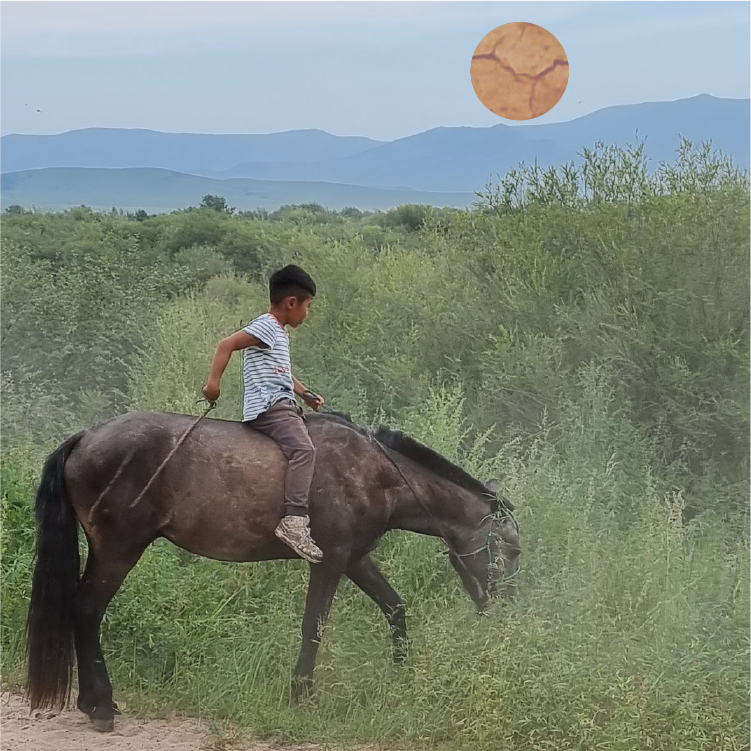 
RG at Board Game Arena discovered a tactic in Silo which gave a large advantage (among top players) to Player 1. Michael Amundsen, esteemed fellow designer, suggested a different object of the game. Get all your checkers into a contiguous stack, possibly with enemy checkers above and/or below it, anywhere on the board (which could only be one of the two rightmost squares). RG's initial impression: "I think his suggestion might work. Not sure. The game is a lot more complicated now." Based on that appraisal, I changed Silo to incorporate the new goal. And I changed the Board Game Arena program. Normally I'm not one to tweak a broken game, opting instead to simply withdraw it. But I really like Silo - even more so now with what seems to me a more elegant goal. I put a lot of work into the graphics and programming... and the game design itself. I discovered the mechanism in a matter of minutes, but this was preceded by many unsuccessful attempts over a span of many years to design where you form a contiguous stack (or sub-stack) of only your own checkers. I finally got lucky with Silo, stumbling onto something that works (or rather will work, with any luck). So why not? Keep your fingers crossed that the new version holds up. Ultra simple games don't come with a warranty. |
| ABSTRACT GAMES MAGAZINE |
Kerry Handscome did an outstanding job with Mark Steere Games - A Retrospective. |
| TANBO IN ITALIAN MAGAZINE |
Tanbo article p. 86 Michael Amundsen: "Would love to read the article on Tanbo." Splooge: "I am genuinely curious: why? [snip drivel] ...self-aggrandising propaganda on the MSG rule sheet: 'Tanbo is a unique, robust alternative to Go.'" What the fuck is wrong with that?? There's no other game like Tanbo. Like most of my games, it's totally unique. Tanbo is robust. Talking with Patrick at ItsYourTurn, where Tanbo has been played like a million times, he revealed that there's virtually zero move order advantage. So far, in the past 28 years, Tanbo hasn't been solved. I don't know what your retarded definition of robust is, Splooge, and I don't care. But to me, Tanbo seems pretty fucking robust. Finally, Tanbo is an alternative to Go. If you have a Go set, and want to play something different, you have Tanbo. Splooge, you couldn't design your way out of a paper bag. Yet you can't stop congratulating yourself on your "expertise". What boggles my mind is why anyone gives you the time of day. Splooge, when you design a unique, robust game, we can discuss your shitty little opinion about Tanbo. Update: Michael Amundsen (in response to Splooge's question, "Why are you interested in Tanbo?"): "One of the reasons is precisely because you have given it flak." You gotta love this guy. Splooge: "I am not just criticising the game... We played Tanbo. The rules are appealing." Classic coward. Talking smack in a designers' forum, and then when bitch slapped by an actual designer, does a complete 180. "Oh no, that's not what I meant. You got me all wrong. Hee hee hee ha ha ha." Empty scrotum flapping in the wind. What's your big claim to fame, Splooge? Your book on heuristics? Incoherent, pseudo-intellectual twaddle. Reminds me of Ralf Gering, though not quite that fucked up. It's amateurish, but not psychotic. You should have titled it "Musings of an Amateur". You're just muddling topics that have already been abundantly covered by actual professionals. You spelled "marvelous" wrong, dumbass. Clear indication of mediocrity. Spelling error on page 1. Let's see if you can get that straightened out. Then I'll have proof you're reading my blog LOL !! Splooge, you're not a designer and you're not a writer. You're a ZERO. "Ploog" - German. I knew it. There must be a connection to Ralf "Hermann" Gering. Two German, English challenged, self important oafs. What are the odds? |
| DODO VS BUG |
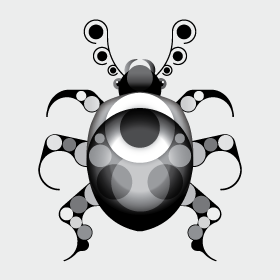
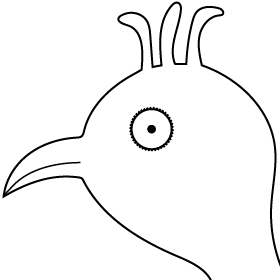
October 16, 2021 Board Game Arena - Games In Progress Dodo: 35 Bug: 18 Bug is desperately clinging to slippery porcelain, fighting the swirl of cold water in the toilet of forgotten games. Normally I don't like to pick on other designers' games, but I make an exception for Nick Bentley. Why? Because I'm tired of hearing his incessant bragging. Incredibly, Nick describes himself as "brilliant". Nick can scientifically create the ideal player experience. His games are not too hot, not too cold, not too opaque... and apparently in Bug's case, not too good. Probably doesn't help Bug that its program is all bugged out. How many times does a game program have to fail you before you jump ship? Nick was bragging (as usual) that someone had offered to program Bug for free. I tried to tell Nick, after a list of bugs as long as my arm appeared, half of them totally ignored by the magnanimous programmer, that he should hire a decent programmer to do it right. But that didn't happen. Now Bug is fighting the swirling tide. Nick disrespected me a few years back, for no particular reason, at least that I was aware of. This combined with his self appointment as the leading authority on abstract game design, while being an unoriginal designer who never credits the games he "borrows" from, pretty much cements Nick's position at the top of my shit list. Splooge is more of a piece of shit than Nick, but Splooge is too much of a zero to warrant inclusion in my shit list. Splooge would be number one on my Insignificant Turd list, if I had such a list. Nick worshipped Bill Taylor, who is now dead, thankfully. I remember Nick calling Bill "one of the greatest minds in abstract games." It was such a bizarre statement. Bill Taylor had a long career as a blowhard, with a tiny fistful of (to me) unremarkable games. Nick, on his website, calls Bill a "great sage of abstract games." But here again, there's no explanation given for the adulation. At least Bill Taylor's few games were original. Nick's games don't even have that. Now Nick is trying to fill Bill's gas giant shoes. "Worship me because... because I'm Nick Bentley !!" Stunningly unconvincing. I think Nick succumbed to megalomania. He so desperately wanted to be an original designer for so long, that eventually he just "became" one - in his mind. The obvious fact that nobody is fooled doesn't deter him in the least. Nick, you claim to be "[looking] in regions of design space where other designers aren't looking." And yes, you are. But only because you're looking in the immediate vicinity of existing games, where nobody else wants to look. You announced, for example, a Reversi knockoff with the disclaimer, "THIS IS NOTHING LIKE REVERSI !!!!" Nobody is fooled by your hand waving. Nick, stop bragging about what you wish you were doing, and claim to be doing, but have never actually done. |
| RALF GERING |
I had forgotten about Ralf Gering. Years ago I wanted him to go away, and he went away. My will be done. Recently, I saw Ralf mentioned in the Abstract Games Magazine article about me. Apparently he had written an article on Byte. I read Ralf's article this morning for the first time. Or, I should say, started reading it. The first thing that caught my attention was the checkers being called stones. This brought back painful memories of the Ralf Gering Lecture Series on the Correct Use of the English Language. See A Designer's Perspective. Then Ralf said that Byte could be called an N-in-a-row game. That's where I bailed. |
| DEPTH, CLARITY, AND DODO |
I read an article by a certain designer slated for publication in a certain magazine, which I can't comment on. [Clarity: Foggy Notions, by Christian Freeling, in Abstract Games Magazine.] But certainly I can comment on depth, clarity, and Dodo. Depth is like consciousness. It has mulitple complex meanings, which can only be discussed tautologically, making said discussions virtually meaningless. Yes, there are vague qualities that games seem to have. But it makes more sense to just discuss a particular game and how it relates to games in general. Even if there were standardized, meaningful definitions of depth and clarity, they would be vastly inadequate in describing the overall subjective experience of a game. Enter Dodo. What jumps out at me, after playing many times, is that it's a very hard game. In particular, there don't seem to be any solid heuristics, tactics, or strategies - at least that I'm aware of. Dodo may be considered to have low clarity at all skill levels, relative to the average game. This is a good thing. Players rated more than 100 points higher than I always beat me. So there's something to it. But it's something that's not easy to articulate. Again, that's fine. You develop an internal understanding of Dodo and you excel. Your underanding doesn't have to be shared. It doesn't matter what you do for the first few moves in Dodo (a good thing). Initial moves serve to "randomly" set up the board for a unique showdown with virtually zero move order advantage in this super robust game. You don't need heuristics. You just need to see, think, and play. Does Dodo have depth, in the sense that you can see several moves ahead along a promising line? Some games, like Dodo and Checkers, have relatively few move choices per turn and so, on the face of it, should allow for deeper searches. But even in games like Chess and Go, which have a huge number of move choices, most of them are summarily dismissed. If you're in a ko fight or 50 move rule situation, only a tiny number of moves are being considered. Many times there are obvious moves or forced moves. I'm far from an expert player of games, but I suspect that there isn't a big difference in search depth between games. And if there is, so what? How does this impact the overall subjective experience? Is a game with deeper searches richer somehow? I seriously doubt it. How deep you search relative to your opponent is what matters. Whether you're searching deep or wide, or weighing the intuitive favorabilities of various directions of play, you're quickly evaluating positions in an efficient and effective manner appropriate to that game. There's more to move evaluation than search width and depth. One meaning of depth might be how hard you concentrate on the gameplay. But this is more a property of the player than the game. Does Dodo have depth in the sense of supporting a huge number of skill levels? Sure. Any robust game that's played long enough by enough people will finely stratify like this. Not a particularly profound concept. Dodo is the essential game, both in its rule set and its gameplay. Yes, it's a parity game. You want to be the last to make a move. But there are plenty of opportunities to shift the countdown in your favor - opportunites to control the timing. I think every game is a partity game to some degree. "Jeez, if it was only my turn right now (or wasn't my turn right now) I'd be winning." Nick Bentley's theory of what constitutes a good game came up in the aforementioned article. I think the essense is that a good game deceives players into thinking they know what they're doing but then later they're surprised to discover that they don't. That a Nick Bentley theory would be based on deception is hardly surprising. Here's the problem with Nick's theory. How many times will a player be so deceived? Three? Five? By the time you've played Dodo twenty times, it's pretty clear that whatever you thought you understood about the game, you don't. You won't be deceived into believing otherwise. Dodo strategies of charging up the middle, dividing and conquering, skirting and flanking, and holding hostages have proven themselves reliably unreliable. Every beginner goes through these eureka, "I got it !!" false starts. The reality is much more subtle. You have to gauge your and your opponent's flexibility and fluidity. Strike delicate balances between attacking and yielding, blocking and unblocking. |
| FRIENDLY COW |

One of my cows is friendly. I guess the branding was forgiven and forgotten. |
| SHUT THE HELL UP |
If at first you don't succeed, shut the hell up. Err on the side of shutting the hell up. A house divided against itself cannot shut the hell up. Life is what happens when you're busy shutting the hell up. Early to bed, early to rise... Shut the hell up. |
| OH COME ON !! |

Oh Come On !! is unusual on a couple of levels. First off, it came to me in a dream. This was the most coherent dream I ever remember having. It was amost like conscious thinking, except while sound asleep. Beyond that, OCO is out of left field, both in a general sense and in being way outside of my wheelhouse. It's not an abstract game. It's not even a board game. There's no equipment whatsoever. OCO is finite and decisive, but only if the players are honest, they're not expressing disagreement with too many of the judges' rulings, and the scenery is rich and constantly changing. Like you're traveling somewhere not in the Sahara Desert. You're lounging in an airport terminal when you notice three slender, young stewardesses walking by (or two skinny ones and a fat one). I never would have consciously endeavored to create such a game. OCO is not hard finite - normally my primary design imperative. But it's way different from anything I've ever designed, it's interesting in its own way, and I welcome it to my portfolio. Just the fact that I designed OCO in my sleep makes it seem like a gift from beyond. Unfortunately, I'll probably never get a chance to play OCO. I never seem to be traveling with more than one other person. During a taxi ride, I did try to spot "three of something" and it does happen. Not too often, but often enough. |
| MY NEW BEST FRIEND |


Puppy who lives at my construction site. Ran away from me the first couple times, but after two dried duck legs he was rolling around at my feet. Now I clap my hands and he comes running. Was starved for attention. No human or dog friends. Was a little bitey. But after two days of bleeding hands, I trained him not to bite. Now he just licks, like a normal dog. Update: Someone took him. I hope they take good care of him. |
| DODO ON YUCATA |

Sweetie. I wanted to take it, but who will take care of it when I'm gone? Shit. Henning Dudat did a nice job programming Zola for Yucata. He shows the last move and the last killed checker, kind of like what people are always asking me to do with my programs. I like it. Maybe I will start doing it. No. I'm too lazy. Addendum: LAVA - interesting new mixed stacks game by Michael Amundsen and Alek Erickson - hard finite and decisive. |
| UNNECESSARY DERISION OF GAMES |


Mongolian campfire. Some local flora got singed by the fire, producing a pleasing aroma. I only release games that, to me, at the time, seem compelling and worthwhile. I thought every one of my games was awesome, the day I released it. In hindsight, some of the games I released I'm no longer crazy about. Many turned out to be unpopular. But even my least popular games always had a few players who thought they were pretty cool. If you're part of the majority that didn't see it, congratulations. Go jump in a lake. I only still like about 5 to 10% of my own games. And the public probably feels the same way about them. But do the less popular games really have to be compared to dihareoea and crap and other expressions of excrement? I create games primarily for my own satisfaction. Secondarily I share them with other designers and the world as self expression. Not for glory or personal gain, or in the pursuit of praise or validation. I don't need any of that (although admittedly it is nice when a game is appreciated). I couldn't care less if a snot ball, bgg rat pack designer doesn't like my game. Fuck off. I've heard complaints about how awful Tanbo is. Tanbo was, if nothing else, my first finite game. It led to many others, including one of my most well thought of, Oust. Though stepping stones to each other, my games aren't variants of each other. I always try to do something different from what's out there (that I know of) and what I've done before. I try to be as original as I can. No man is an island, but to the extent possible... Not all of my games have to be smash hits. They all have a place in my portfolio, in my design experience. Creativity isn't just output. It's input. You're learning by doing - gaining insights that fold back into the design process. The design process itself grows and matures, deviates, regresses. Early on I didn't like the stalemate ending, but now I embrace it for its purity. I didn't see it before. Sorry, but I have yet to see another designer's game that I like as much as my own. Maybe it'll happen one day. But so far, no. If your game is more popular than mine, and you think it's better than mine, that's fine. You're entitled to your opinion. Take it with you on your lake jump. I'm not using a shotgun approach to game design, just shitting out tons of games in the hopes of one of them taking off. I design games because it's fun, and it's rewarding when something comes together. I design games that meet my criteria, some of which criteria hold steady and some of which evolve. I don't evaluate the gameplay of my games because I'm a way below average player of games, and my retarded view of the gameplay wouldn't be relevant. And I don't have the patience to playtest. As I've said before, gameplay is just not where it's at for me. If this inconvenienced you, forcing you to playtest my game that you know I didn't already playtest, and you ended up not liking it, TOUGH CRAP !! If my refusal to playtest my games puts you on a superior plane, great. Enjoy your swim in the lake. Btw, I'm not addressing any particular individual. I'm responding to a montage of asinine criticisms from the bgg rat pack. It's like Willard. Grimy rodents crawling all over each other, licking viruses off each other's assholes. Even with Nick Bentley, I'm not criticizing his games. I'm saying they're not original, because they aren't. Nick is so desperate to be original that I think he actually believes his own horse manure. It's sad. But I'm not calling his games crap. They may be good games for all I know. They may be amazing. I'll never know because I'll never play them. Not that I perceive something wrong with them. I'm just not interested in playing 99.9999% of games, Nick's games being no exception. Right now I only like Backgammon and Dodo. Well, I guess I play a little Zola now and again on Christian Freeling's MindSports, since he was the only one to program it for a game site. Other game site proprietors rejected Zola because it didn't quite rise to the level of their in-the-toilet standards. One guy programmed Zola for Yucata recently. Did a nice job. It'll be coming out soon. And I suppose I'll eventually program Zola for awesome game site Board Game Arena. Wow, how did BGA escape my notice for so long? Actually I first found out about BGA from Nick Bentley bragging about his games' abysmal performance there. Thanks Nick !! |
| LOL !!!! |
Nick Bentley: "I try to look in regions of design space where other designers aren't looking." Michael Amundsen: "How do I square this with your relative lack of interest in originality? Or is not caring about originality one of the things you do differently?" LOL !!!! Exactly. Nick's original design approach is to never do anything original. Nick Bentley: "Well, I assume that if I'm rooting around in regions of design space others aren't, originality will take care of itself, on average." No, not "on average", Nick. How about "never"? Nick, the only thing you're "rooting around in" is your own ass. Please stop congratulating yourself on your non-existent originality. You're giving me dry heaves. After all your pontification on people convinced of their own entirely wrong assumptions, you've just precisely pinpointed your own. Update: Nick said... "Maybe there's no difference between a 'tweak' and a game." This is totally accurate, Nick. For you. |
| AARON AND HOUSEKEEPER |
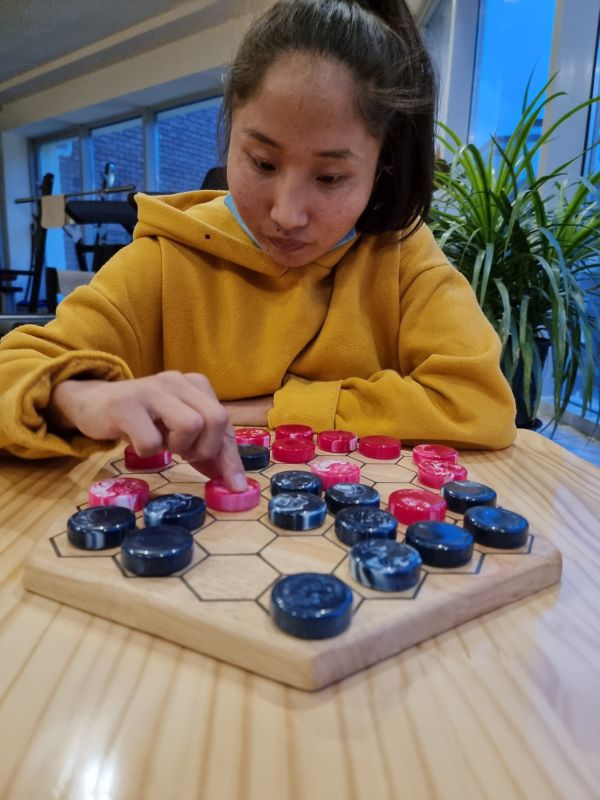
Calling all Aaron Daltons. Calling all Aaron Daltons. Does anyone know what has become of Aaron Dalton (of Super Duper Games fame)? Maybe he's gone off grid or something. Update: I heard from Aaron. He's doing fine. Housekeeper deep in Dodo thought. (Dodo housekeeper deep in thought?) |
| DODO UPDATE |
Welp, still not a single bug in my Board Game Arena Dodo program. [Nick Bentley: "OH MY GOD HOW IS THAT EVEN POSSIBLE ????"] I did add a misere option which caused the wrong winner to be declared in games started before the misere option was added. Basically, the upgraded version was trying to check a game option that didn't exist when the game was started. Can't really call that a bug. More like "predictably incorrect behavior from games started before an upgrade." Games finished before the upgrade or started after the upgrade haven't had any issues. My Dodo rating is 100. I'm seeing ratings in the high 200s. So progress is being made, by some. Is Dodo "opaque"? I don't even know what that means. I suppose it's relative. Dodo is, by all accounts, a hard game. But if you're naturally clever, you have a little experience, and you're winning a lot, it probably doesn't seem opaque. Probably seems more like you know what you're doing. I can only imagine what that must be like. |
| GO STONES UNBOXING |

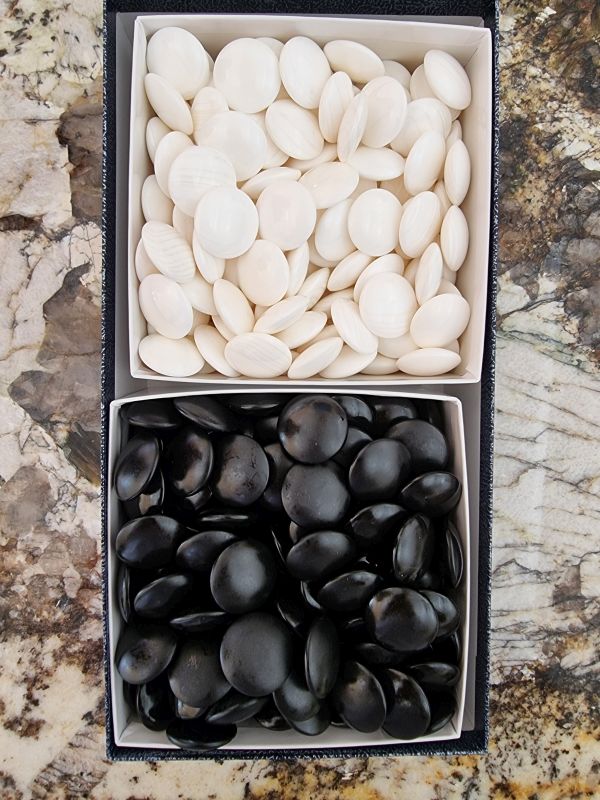
Finally got my damn Go stones from Japan. They were held up in Incheon for like 2 weeks. What does that shit say? "Go Stones Inside." Ah so. Photographed the stones in preparation for... You guessed it. REDSTONE !!! (Board Game Arena program.) 9 years just went by and no lazy turd game site owners programmed this significant game. I guess it was just too hard for them. Assholes. Now it's up to me. If you want it done right, do it yourself. Or in this case, if you want it done at all, do it yourself. Shit fucker programmers passing judgement on which games to program and which games not to. Fuck you. It's a Mark Steere game. Is there anything else to think about? Fuck off. [Hmmm. Maybe this is the beer talking. Oh well, let it talk. Here in Mongolia we have a different kind of Budweiser. Way better than piss water American Budweiser. But then again, what isn't? Apparently there's a long ongoing trademark dispute. But trust me, this is the real Budweiser (in a frozen mug with ice crystals floating on top. Perfect beverage.)] Photographs taken, gobans created in sizes 9, 13, and 19. I'm making 9 the default. 99% of players never consider options beyond the default. Selecting a non-default option requires two mouse clicks - way too much trouble. Slow and steady with Redstone. I'm not getting overwhelmed by it like I did with Gopher and Dodo. Workout in my home gym in the morning (I hate being fat). Then work on Redstone for a couple hours in the evening. It'll get done eventually. And without bugs - unlike Nick Bentley's Bug program. It's like the Roach Motel. Bugs check in but they don't check out. What The Fuck ??? |
| CHRISTIAN FREELING'S GOODBYES |
I've lost track of how many times Christian has bid bgg farewell. It usually lasts for about two days. Parting is such sweet sorrow... except when it starts getting repetitive. |
| DODO STRATEGY |
Update: One player at BGA, RGRGRG, always kills me, and says he (gender not clear from name, but I will use "he" for convenience) beat AiAi 2 times out of 20. He says he has tactics and strategy and will fill me in later when he has time. Dodo skill is progressing perfectly, it seems to me. It's advancing very gradually. Players are developing vague clues, which are then later doubted and reworked, and which are difficult to articulate. To me, that's ideal. Gopher, in comparison, does have clear tactics and it came close to being solved. One math professor (it's always the math professors, lol) didn't really have a system he could articulate but he's a super good player who almost never loses. He thoroughly understands Gopher, but in a way that he can't explain. I'm much more satisfied with Dodo, both its gameplay and how skill is advancing. And it is advancing. Early on it seemed totally random. Now, partway through the game, I can see potential strategic opportunities, which may or may not pan out. I've always wanted a robust, simple, opposing armies game, and now I have one. I'm getting positive feedback about Dodo. A few people are really liking it. One guy was playing back to back games in real time for hours on end. I asked him how he's liking Dodo and he said, "It's interesting." LOL I'm liking Dodo too, but I switch back and forth between Dodo and Backgammon to keep myself from getting overwhelmed by either game. -------------------------------------------------------------------------- Unrelated: Michael Amundsen has an interesting concept in Meter - "relative perimiter". Unique, original, creative... Unfortunately he slapped it into a game with incongruous elements, including the so-called Catchup goal (seems Nick has claimed credit for something that's been around since dinosaurs roamed the earth), which I'm not a huge fan of. But still, it's nice to see something new for a change. Michael is a good architect. -------------------------------------------------------------------------- Mike Zapala feels that he's developing Dodo tactics, that are hard to articulate. And that's perfectly reasonable. I know Dodo isn't going to be like Reversi where sides are good and corners are better. Dodo's tactics will be a lot more involved than that. I take Mike seriously because he's generally known as a good player of games and he's ranked in the top 10 at Dodo out of a few hundred players at BGA. (I'm ranked 55th.) We played a game of Dodo. I had no idea what I was doing, as usual. At some point an opportunity came up for me to shut it down and I pounced on it. Mike probably got overconfident or made a careless error, or both. I ran away and savored my victory. I'm sure it'll never happen again, and I wanted the moment to last. (Actually I did have something to do. I'm getting started on my BGA Redstone program artwork.) Mike said he's not beating AiAi. I, feeling my oats, took another crack at AiAi at the lowest thinking time setting, 1/10 second. That thing is so fucking good, I don't have a prayer. It's artful in how it defeats me. After realizing how futile my attempts still are, I played a few more times just to see if I could observe what it's doing, or not doing. AiAi plays differently every time. Sometimes it spearheads the middle. Sometimes it advances along one side. One thing it's not doing is making mostly forward moves or mostly oblique moves. It makes both types of moves about equally. Dodo is not a game of boldly charging forward, or timidly holding back. It's a game of balance. It's a game of timing. Dodo the essential game. All you have is lookahead - peering as far as you can into possible futures. Again, I take Mike seriously, and he may be onto something. Or he may be developing something. But he says he's not beating AiAi, and AiAi isn't using any particular tactics, at least that I can identify. It doesn't matter if I move first or second. AiAi beats me just as handily either way. I don't share Mike's confidence that significant first move advantage will develop in Dodo any time soon. Mine is an admittedly biased hunch, but I think Dodo will continue to stand tall for a long time. |
| NEW DIRECTION SUGGESTIONS |
Dice. I wanna see dice. Who the hell said we can't have random elements? Is this a religious tenet or something? It's fucking racist. Don't be afraid of dice. If cards is more your cup of tea, then use cards. "But... there are other groups for that." No, there really aren't. Don't be such a pussy. Themes. Even if a game is totally abstract, like Dodo, slap a theme on it (like a dodo bird theme). It's part of the presentation. Like Mattock. Totally abstract game, not hurt at all by the miners theme. Makes it a little more interesting. Artwork. If you're smart enough to design an abstract game, you're smart enough to watch a few youtube videos on how to make artwork. Astralis. The Bug beetle. Again, part of the presentation. Like you go to a nice restaurant and order filet mignon. You're expecting some garnish or a side order or a glass of cognac or something. Not just a slab of meat on a plate. When you produce a game without theme and art, it's like you're going out on the town in a worn out AC/DC tee shirt. Put some class into it. New, original concepts. I'm seeing the same old shit rehashed again and again. I guess it's unavoidable to an extent, but put some effort into new concepts, like Seesaw. Simplicity. Junket, nice concept. If it's super simple, it may similar to other super simple games, but sometimes there's a tradeoff between simplicity and uniqueness. Incomplete concepts and mechanisms. Don't waste everyone's time with that shit. I have a million concepts and mechanisms I keep in my Concepts and Mechanisms bag, for possible future use. If you can't make it into a complete game, then just keep it to yourself. |
| DRUNKEN DODO |
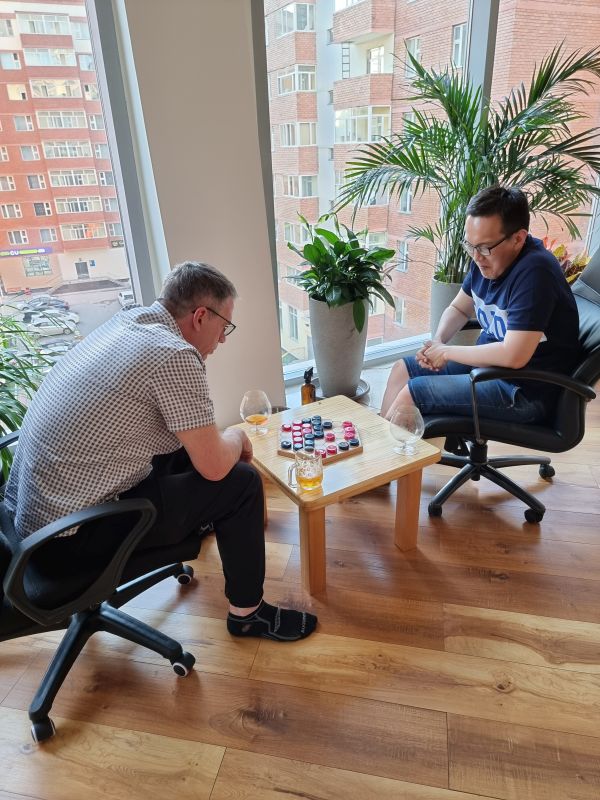
Dodo goes great with cognac and beer. But then again, what doesn't? LOL My friend beats me more often than not. Oxford educated lawyer. Speaks English better than I do, with Oxford accent. Meanwhile, I can count to two in Mongolian. |
| SIMPLE GAMES AND WHAT I LIKE |
People were bitching about Gopher. Not so much with Dodo. Now I see other designers coming up with super simple games. Nice to still be influencing the state of the art. I'm not particularly into flippy designs, just because Othello discs make it too easy to design finite games. Not complaining about any particular game. Just a general comment. Come to think of it, there are a lot of things I'm not into: Neutral stone games (Redstone notwithstanding); games where you place two stones per turn; games where you can place a stone or move a stone or both in one turn (or phase games where you first partially fill the board with pieces and later start moving them); games with non-generic pieces like rings and balls and cones and shit (Amazons being a notable exception). I guess I'm ok with tiles now, though I probably won't be designing with them myself. A little bit open to unusual boards, though again, probably not in my designs. I hate the cliche knight move. Sorry Christian. Try as I might, I just can't seem to embrace that. Games with stone counting (Oust and Rive notwithstanding). Nothing especially wrong with in-a-row games (other than first move advantage). I'm just not into it (unless I can make one decisive, which I haven't succeeded at so far). Looping games. The loop goal just seems too ambitious. Like your opponent has to stand there with his thumb up his butt while you run a complete circle around him. Reminds me of hero movies where enemy combatants jump out into the open from behind perfectly good cover to make it easy for the hero to pick them off. I am aware of the recent, interesting developments in looping games, but they're still not floating my boat. Tumbleweed is nice but I haven't seen any other line of sight games I like. Actually I kinda like Tako Judo. Mancala style games. Not to pooh-pooh anyone's design. I've seen some clever takes on seed sowing, like Mike Zapala's use of dice in Lelac (I like dice). But seed sowing just isn't doing it for me now. It's too one dimensional. Backgammon is one dimensional and I play that every day. It's just an unfortunate habit with a large player base though. Tired of square grid connection games. Enough already. Micro-variations of existing games. Nick: "This game started as a variant of Blooms, but..." Nick, why are your new games exactly like your old games? Branch the fuck out. You're boring me to death. Any non-finite games of course. Thanks to Christian for reminding me of my still true assertion that draws are like a cancer that eventually kills a game, LOL !! I can't think of anything else to complain about right now. I'll update if I think of anything. I don't have any particular problem with Chess, Xiangqi, etc., contrary to what people may believe. Good concept. Opposing armies. Different pieces having different functions. Checkmate... I like it (though I won't be doing it). I've attempted to design a number of simple, opposing army games (some involving mixed stacks), but they quickly succumbed to overwhelming first move advantage, and were tossed onto the scrap heap. Dodo is a powerful counter-example. I remember Breakthrough making an impression on me when I first heard of it. Mixed stack games. They're hard to represent on computer screens, and just aesthetically, I think I like mono colored stacks more. It would probably be easier to list the things I do like than don't like. But what fun would that be? Checkers would be ok except the jump has become so wretchedly cliche that it reflects badly back on Checkers. A note on originality. Nick on Slice: "To be clear, this game didn't come at all from Othello thinking." Oh no, not at all. LOL !! "This game, a Catchup descendant,..." In other words, "PAY NO ATTENTION TO THAT OTHER GAME THAT HAS NOTHING TO DO WITH SLICE." If you wave your hands any harder, you're going to lift off. Or jack off. Maybe Splooge can lend a hand. Nick, "to be clear", this is a recurring theme with you. Stop it. Regardless of where the thinking started, Slice ended up being a minor variation on Othello, a game you were obviously well aware of beforehand. Just call the game what it is. I can't imagine anyone buying into your oft repeated "original thought process" pitch. It's like a guy with a 2 inch dick bragging about his 20 inch dick. Oops, wishfull thinking and a misplaced decimal. Stop the ridiculous forays into make believe. It's called integrity. Look into it. |
| MISERE DODO |
Kerry Handscome made a couple of observations about Dodo. "An interesting thing about this game is that it reverses what you might think of as a normal goal: immobilize your opponent. Morever, I don't think the game would work well if the objective was to immobilize your opponent." Good points, both. Now, if you view Dodo as a race to the other end, where your checkers become immobilized upon piling up there, it kind of makes more sense (I think). Anyway, that's how I've viewed Dodo from the outset. When checkers were getting trapped halfway across, I just incorporated that into an overall goal of getting immobilized, either by piling up at the opposite end or by getting trapped, or both. It does seem, at first glance, like Misere Dodo would not be as good. But who knows? I haven't really play tested it. The goal choice may turn out to be somewhat arbitrary. In any case, I've added a misere option to the BGA Dodo program. I only tested the program to the extent of charging both armies forward with no pass-through to make sure it was working right. But I haven't put much thought into Misere Dodo gameplay. Update: As hard as Dodo is, Misere Dodo is even harder. You want to remain free and stop your opponent, but to do that, you might have to open a channel to free him temporarily. Paradoxical. |
| SPLOOGE UPDATE |
The guy has never designed a game in his life, but he's in a designers' forum making retarded criticisms of abstract games. Does it get any more asinine that that? Unfortunately, yes. Lately he stuffed his shit covered shoe all the way in his mouth, instructing a designer on the "etiquette" of naming games, calling him (of all things, lol) "arrogant" for rejecting Splooge's advice to rename his game to something not a duplicate another game name. There are 4 other games with "gopher" in the title. 12 with "dodo", including one straight up Dodo. Books, movies, paintings, cities... EVERYTHING has duplicate names. Similarly named things are distinguished by their content. The other Dodo for example. "Save the rolling dodo egg by building rickety bridges down the mountain." Could anyone (other than Splooge) possibly be stupid enough to confuse that with my Dodo? There are so many games, you'd have to give them alphanumeric designations, like in astronomy, to avoid duplicates. NEWSFLASH: NOBODY HAS EXCLUSIVE RIGHTS TO HOUSEHOLD WORDS USED AS GAME NAMES. YOU'D HAVE TO BE A COMPLETE FUCKING IDIOT (Splooge) TO ASSUME OTHERWISE. If it looks like a pile of shit, smells like a pile of shit, and is about as necessary as a pile of shit... it's probably Splooge. How does something that shitty come into existence? A dog has to eat something putrid and hold it in for as long as possible, prolonging the putrification process, before dumping it on a living room carpet. Dear Splooge. Go. The fuck. Uhh-WAAAAY !!!!!! |
| EL POOPO FORMATION |
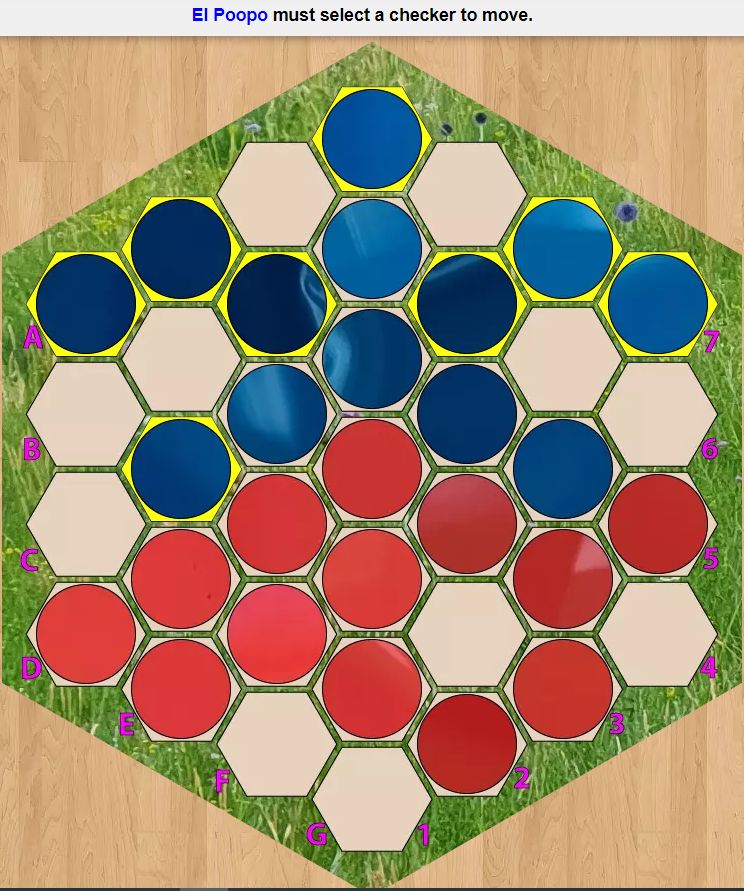
"The Emperor"? "Michelin man"? I'm open to suggestions. Fredski is one of my best players. If Nick can beat him, I will (almost) never question his intellect again. Btw, "Stinker"? "El Poopo"? What's this obsession with the repulsive? Never mind. I'm sure I'm better off not knowing. Bug bugs update: The Bug bug report is as long as my arm. Most of the complaints are just being ignored. All of them have numerous thumbs up votes. I guess the adage that comes to mind is, You get what you pay for. Nick, I'm telling you, scrap it and start over. Trying to patch up a bad program is not the solution. All of the problems your'e having point to a seriously fucked up program. The problems are intermittent, and they're going to stay intermittent. You need a solid foundation, which you don't have. I programmed Dodo myself and there hasn't been a single bug. Not one. There have been suggestions. Highlight the last move, etc. But no bugs. It's not that hard. You just have to follow protocol. Hire the guy who programmed Blooms. He did a really nice job with that. El Poopo/Fredski update: Hmmm, it appears El Poopo won. Nice job Nick. The power was out last night so instead of the usual movie night with beer and cognac, we had Dodo night with beer and cognac. I lost most of them. At one point I forgot I was Red and moved a blue checker backwards. My opponent was like, "Hey, that's mine." |
| FAIR GAME |
Some clown on bgg, in the tradition of innumerable bgg clowns before him, said "Everyone here is aware that there's no such thing as a drawless, fair combinatorial game, right?" True, but misleading. The implication being, only non-decisive games can be fair. Chess has draws and also has first move advantage. Checkers has draws and also has second move advantage. The draw outcome itself is "fair" in the sense that both players are equally likely to have a draw. But if it doesn't end in a draw, someone had an advantage. No game is perfectly fair, be it decisive or non-decisive. The two players are each playing a different game. Player 1 is playing a game that starts with a symmetrical opening position. The starting position for Player 2 is different. Right at the outset there's an issue. The pie rule helps level the playing field (in games with first move advantage), but doesn't eliminate the problem. It's still two different games. Assuming imperfect play, and it wouldn't be much of a game otherwise, there's luck. You're making informed, educated, intuitive guesses, but guesses nonetheless, about the best moves to make. Players are never perfectly matched. Neither is at a precise skill level. A player's skill varies with fatigue and distraction. Your skill level can waver during the course of a single play. Not just perfect play has to be considered in evaluating the fairness of a game. By itself, it's meaningless. Random play also has to be considered. Dodo is probably one of the fairest games there is at 50.5% wins for Player 1 in random play. Human play, the kind of play that actually matters, is somewhere between the two. For beginner Dodo players, and probably all Dodo players, factors that are WAY more significant than who moves first are how lucky you are and how focused you are. If you're on top of your game and you've got the wind at your back, that .5% (which will be at least slightly higher among skilled players) will be like a little ripple superimposed on a big ocean wave. Or a tiny pebble stuck in your shoe tread during a marathon. In other words, relative to all the other factors influencing your chances of winning, it just doesn't matter. The pebble is there, and if you want to blame your loss on the pebble, that's your prerogative. But that would have to be classified under the general heading of "Sour Grapes". I understand, the bgg clowns are trying to make an aesthetic point, but it's a fallacy. Non-decisive games are not inherently more fair than decisive games. The draw likelihood of a game is totally independent of the fairness of the game. Oh, by the way. Every game is a game of luck - both for the reason outlined above and because the game always starts with a coin toss to see who gets to (or has to) move first. Is there anything luckier than a coin toss? |
| SAMSUNG S21 ULTRA |
Got myself a Samsung S21 Ultra today. What does this have to do with abstract games? Not much, I guess. Except now I can play Dodo on my Samsung S21 Ultra. |
| DODO STRATEGY |
Nick Bentley's Take On Dodo: "1. Move straight forward, rather than obliquely forward, especially for stones that start in the middle of your initial formation. 2. It's better to move up the center of the board and make your opponent flank around you, than the reverse. "If so, it's possible that the dominant strategy is: "1. Move the pieces at the center of your formation straight forward, starting with the ones at the front of your formation. 2. Then moving the pieces behind them straight forward as well. 3. If the other player doesn't adopt this strategy, you win. 4. If the other player does adopt this strategy, all the pieces will first gather at the center of the board, at which point there will be cold and fairly obvious a 'who has to move obliquely first' battle, and the outcome of that determines who wins. probably Player 1. "This is just an operational hypothesis. Not convinced it's right. Just putting it out there for study." Another player confirmed that this strategy "absolutely crushes" humans and AI alike. I tried it and it didn't work for me at all. Maybe I'm doing it wrong, but I still can't beat any AIs. Only thing I can think of to explain the discrepancy is that my computer is faster and does more in a second (Ludii lower limit) than the tester's computer does in 10 seconds. Hard to imagine though - this crappy Dell I bought in Mongolia 2 years ago is superior to anything. But, if your computer is 12 years old, that could explain it. The notion of moving up the center of the board and making your opponent "flank around you" is perfectly lovely... assuming your opponent is the accommodating sort and willingly opens up a channel in the center for you. There's no way to force your way up the center, that I'm aware of. I'm not really fit to comment on strategy, but that being said... The AIs always beat me and they always make plenty of oblique moves. Logically, if you're using Nick's "tight formation" strategy by advancing your front row of checkers directly forward, then nestling your next row in right behind them, etc., you'd do better to hang back (by making oblique moves) and let the enemy come to you. You can keep your formation tighter if you're not on the march. But then if the opposing army approaches with an open channel, your "tight formation" won't be tight for long. I think there is something to it - keeping your army tight, as one of many possible tactics, but it's a long way from a game buster. [Thinking out loud here. Nick stimulated my feeble thought process.] There may be a tactic of rushing some of your checkers forward, trapping a couple of enemy checkers, and later freeing them at the last minute. It's the yin and yang aspect of Dodo. It may be a game of strategy, counter-strategy, counter-counter strategy... Update 1: I've tried Nick's strategy several times as Player 1 and Player 2, using different Ludii AIs set at 1 second. I haven't won yet. Maybe the guy who's "absolutely crushing" everything is using a vintage Atari. Update 2: People are questioning Nick's strategy. 1. "I'm obviously not understanding the strategy, because I am unable to [win]." 2. "The strategy seems to fail against Ai Ai (UCT based AI)." "The Crusher": "I tried again today and the strategy was much less effective. [...] I think I may have just gotten lucky playing against the AI yesterday." Yes, luck combined with (I believe) running the AI on an antique computer with 10 seconds thinking time. I've never been able to win, with or without Nick's strategy, running AIs at 1/10 second (AiAi lower limit). Of course I'm a dodo of a player, so that has to be considered. The good news: Nick started a conversation and got me and others thinking about Dodo strategy. Hopefully a talented player will take an interest and clue the rest of us in. I think Dodo is a complex superposition of parity battles - a juxtaposition of interdependent flows - a quicksand beach. Charging ahead and butting horns isn't by itself a strategy. There has to be interplay between charging and stalling. Sometimes you can hold back and wait until your opponent has no choice but to block you. An oblique move only carries your checker half as far as a directly forward move, so a strategic oblique move or two can have a big impact on timing. And it's all about timing. There will be opportunities throughout play to toss a wrench into the gear train and win. Spotting those opportunities is essential. I can spot them - after they happen and it's too late. I gotta turn that around and see them ahead of time. |
| MSG BGA UPDATE |
I finished my Dodo program for Board Game Arena. Now in alpha !! Very exciting. Had a party last night. People playing Dodo. The lady saw the board, was asking about it, wanted to play, lost, wanted to play again, lost again... Then had enough. 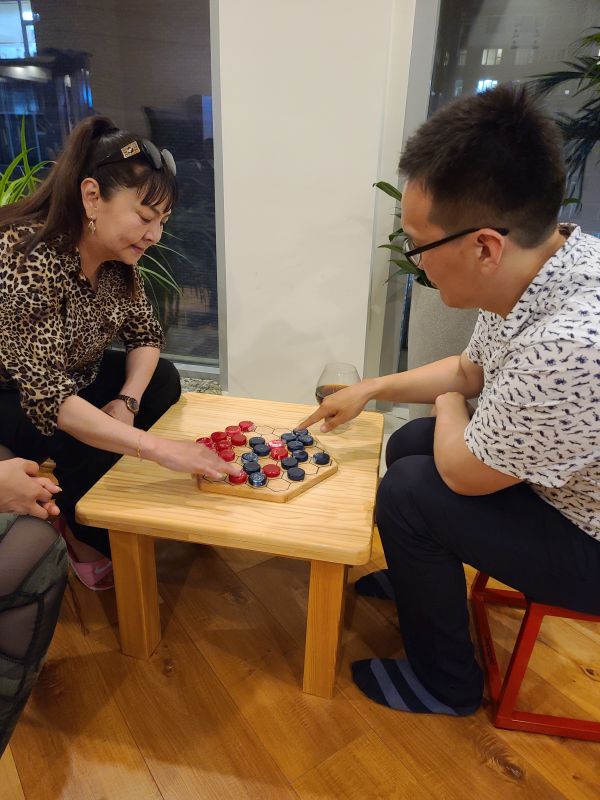
Just getting started with my Redstone program. Kind of exploratory at this stage. Will have pie rule. I just need some Go stones to photograph, including some red ones. |
| NICK BENTLEY |
Nick: "I like the principle that one should play a game before issuing criticism." Hmmmm, this is the second time in a month Nick has said something intelligent. It can't just be a coincidence. I might have to find a new villain to roast. Splooge is too much of a zero to qualify. Self important, asinine zeros grow on trees. Bill Taylor was a good villain, but he's dead now. I can't very well dig him up and re-villainize him. Well I guess I could, but nobody wants to see, much less smell, Bill Taylor's bloated, stinky body with worms squirming in his eye sockets. Bug question: "Do you know if the developer ever actually fixed those game breaking issues [in the BGA Bug program]? Nick: "It's mostly fixed. We actually had one odd incident yesterday, the first since the game went into beta... where a player was allowed to merge groups illegally. The dev told me it was likely due to a very rare circumstance in which the BGA client missed an update about game state. He's looking for a way to prevent it." Nick, that type of issue should NEVER HAPPEN !! Not 1 out of 10 times, not 1 out of 100 times... NEVER !! I'm a long way from being a professional web developer, but one thing I learned from programming Gopher and Dodo is that the state machine is everything. Program flow is like pinball, and every other bounce is off the state machine. Play only advances when the state machine has given notice that the state has changed. There is constant interaction with the state machine, as required to maintain order in the tumultuous back and forth between frontend and backend over unreliable internet connections. The state machine's raison d'etre is to provide sychronicity, to guarantee lockstep. It's completely failsafe... IF protocol is observed. Sure, it's possible for the client to "miss an update" from the state machine. But the server will keep trying until the client is eventually notified. Meanwhile, the client doesn't do anything until a state-change notification is confirmed. If the client did something after having "missed an update" from the state machine, something is seriously wrong. It doesn't even make sense. This isn't a bug. It's a calamity. My advice? Scrap the program, start from scratch, and do it right. You'll forever be plagued by this shit. Bug report after bug report. I had bug reports about Gopher. Three firefox users had invisible checkers. Not to be a finger pointer, but as I said in my response, there's nothing sinister about the Gopher program. It's an exact copy of the Reversi program with the board swapped out and the minimum modification to the game logic necessary to transform it into Gopher (e.g., still using playDisc, but with hexhex coordinates). And... they were able to clear up their own problems by rebooting the computer in one case, and deleting unnecessary browser add-ons that were creating a conflict in another case. I haven't heard any complaints since that initial little flurry. One guy said the checkers are ugly. If you have a state machine issue, which it sounds like you do, that won't go away. |
| CHRISTIAN FREELING |
Christian: "During certain times certain inventors are prevalent. A couple of years back Mark Steere claimed the top spot and he went so far as to declare that draws are cancerous. They grow in a game till eventually it dies. Complete nonsense, but it met amazingly little objections. After that Nick Bentley took the top spot but Mark's influence lingers." Lol, I completely forgot about the cancer analogy. But it still makes perfect sense. Christian: "If I'm allowed to stride off topic for a moment (probably not but I'll take the risk), we had a flame war at rga about Symple. I was right all the way but I lost the war. Mark is very good at it and I got no support whatsoever for Symple. Now there's a number of hypocrites who find it 'a great game' because a much smaller number indeed recognised it, although none of them said anything in support of the game by countering all the nonsense Mark told about it. And all the while Mark really didn't understand the game." Sorry about the flame war, Christian. I had an even shittier attitude back then than I do now. I've included Symple in "the list" on my website, so hopefully that makes amends. I invited you to rga to unleash you on Bill Taylor. But, as often happens with unleashed things, they can quickly get out of control. Then I ended up turning on you like a bad dog. When I was a small child, a lady told me that "people who live in glass houses shouldn't throw stones." I was troubled by this for years. I didn't live in a glass house. I didn't know anyone who lived in a glass house. I had never even heard of a glass house. Eventually it dawned on me. "Ohhhh, I've been living in a glass house all along. I'm someone who should never throw stones, under any circumstances." Now, all these years later, I've been banned from the glass houses. But I still like to throw stones at them - from the outside. I don't want a glass house collapsing on me like that condo tower in Florida. Update: I guess Christian doesn't like Dodo. He said he was too busy vacationing to program it for MindSports, but then immediately went on to program 5 other games. |
| DESPERATE BGG-WIVES |
Splooge: "I am not a designer, [but blah blah blah blah blah]." Kind of like, "I'm not a doctor, but I play one on TV." But actually more like, "I always step in dog doo before putting my foot in my mouth." Everyone in the forum is a designer except Splooge, self appointed expert on game design. What a dick. BGG-wives are so desperate for any game related discussion that they tolerate Splooge's twaddle. Hey Splooge. After I finish programming Dodo for BGA, I'll probably program Redstone. Give you something to complain about. "I've never actually played Redstone, but [stuffs shit covered shoe in mouth]..." Update: Splooge: "I know that. I am writing a book about this stuff." Ohhhh, so that's why you're an expert on game design. You're writing a book. Thanks for clearing that up, Splooge. |
| DODO BGA PROGRAM UPDATE |
I'm making slow but steady progress on my Dodo program for Board Game Arena. My Gopher program was just a copy of their Reversi program with the board and game logic swapped out. For the programming I just googled everything I needed to know. I learned very little about their system and about programming. It was like my apartment here. I totally demolished the top floor of an office building, and replaced the offices with a huge penthouse apartment exactly how I wanted (big bathrooms, floor to ceiling windows on all sides, big open area, gym,...). Now with Dodo, it's more like tearing the whole building down and rebuilding it from the ground up. Why? Because the program kept having issues, and it was ultimately easier to delete the Reversi/Gopher/Dodo mishmash and start from scratch with pure Dodo. Unlike Gopher, Dodo has two board orientations, one for Red and one for Blue. And checkers are moved, not just placed. Doesn't sound like much of a difference but it is. The Dodo program is vastly more complicated. Now I am learning the BGA system. It's a very convoluted relationship among various server files (including a state machine), javascript client, css... Program flow is like pinball. As far as my blossoming programming skill... No. I'm still just googling code snippets and copying them, LOL. The internet has TONS of information on anything you'd ever want to program, and every programming language you'd want to do it in. Btw, apparently "programming" is an ancient word nobody uses anymore. Now it's "developing" or "engineering". Exact same thing but engineers get paid more than developers. I'll just keep calling it programming for historical reference. A few game site proprietors (Arty, Aaron, etc.) have offered to let me program for their sites in the past, but I just couldn't summon the motivation to do that much work and end up having little or nobody playing my games there. I think other than BGA, iggamecenter is my favorite site, even though it has virtually no players. The site has a lot of untapped potential. One thing that would make a huge difference would be to have the option of turn based play instead of only real time play. What's the big deal? It's just a matter of increasing the time allowed for making moves, right? Most of the game site owners I've known (not Aaron [truly nice guy] or the owners of BGA, whom I don't know) have a tendency to lord over the designers of the games they're using. I find this most disagreeable. To me designers are the true lords of the kingdom. Site proprietors are just migrant laborers picking beans. They do have an important role to play. People need beans after all. But they'll never ascend beyond the ground floor. Pick pick pick.... a day in the life of a migrant worker. Update: Actually that was a tad condescending, LOL !! It was only directed at the lording asshole types. I generally hold programmers in high esteem (except when they're assholes). Programmers were essential in putting me on the abstract games map. And, on the flip side, us designers put their game sites on the map. Many programmers fancy themselves designers, LOL !! Slim chance. Very. They DEFINITELY couldn't do it alone. In any case, I don't want to be dismissive of programmers now that I'm programming my own games - not even the shitty, lording, asshole programmers. |
| GOPHER UPDATE |
Apparently, Gopher's popularity at Board Game Arena (185 games in progress) was just an initial surge, and it has now settled into high 50s / low 60s games in progress. The surge was accurately predicted by Nick Bentley, as dutifully reported by Mike Zapala... (?) Yes, I got a little ahead of myself with Gopher. That's why this is the "Thoughts" section and not the "Treatise" section. Update: Gopher is gaining in the ranks again. It's at 75 games in progress now, 10 points ahead of Circle of Plagiarism, and 9 points ahead of Hex. Maybe just a temporary bump. Let's see. |
| DODO DATA |
It's 3:20am Mongolia time. I just played 100 games of size 4 Dodo on Ludii - AI vs AI. Or, more specifically, MC-GRAVE vs MC-GRAVE with 1 second thinking time. This AI level is approximately equivalent to a very smart person with a little Dodo experience, or a reasonably smart person with a lot of experience. The result was Player 1 [48], Player 2 [52] - statistically consistent with an extremely robust game having no discernable turn order advantage at that skill level. Michael Amundsen found that in 10,000 random Dodo playouts, Player 1 won 50.5% of them. In comparison, the first player in Hex wins 52.42% of the time. A few days ago I ran tests of insufficient length, and surmised a strong second move advantage in Dodo. I wondered, How can a game with such a large game tree, and such a wide range of total number of moves per game, magical, pervasive, strong second move advantage? And I suppose a game could have such a thing. But in the case of Dodo, No. It doesn't. I had leapt to a conclusion based on insufficient data. There are streaks of luck in game playouts. In a sample of ten games, a streak is more likely than not. In a sample of 100 games, most of the streaks cancel each other out. You'd really have to play 1000 games to get an accurate estimate of turn order advantage. But 100 games is fairly definitive. |
| COREY CHRIST |
Every other bgg post, Corey Clark is giving a sermon on Christ. Then he says it might not be "appropriate" to discuss games with dice. The Christ nonsense is really irksome, especially contrasted with his complaint about dice. I'm working on developing a game with dice. It's not easy. I received my milled aluminum dice from America a few days ago. Psyched about that. Corey sometimes makes disparaging remarks about Hex and its inventors, most recently calling Hex "reductive". Hex wasn't reduced from anything. It was created from nothing and became the seed of many ideas to follow. Hex is as excellent today as it ever was. The inventors of Hex were geniuses. Corey looks like a total vegetable staring blankly into space in comparison. Actually, strike the "in comparison". Update: Bill Taylor died last year. LOL !! I was thinking about Corey sermonizing about Christ in an abstract games forum and then having the audacity to complain about a dice game being mentioned. I wondered, Can a person's head really be that fat? Then I remembered Bill Taylor. I googled him specifically to find out if he's still alive. He isn't. LOL !! |
| UNINFORMED OPINIONS |
Note to "the game whisperer" (a name I gave Christian Freeling long ago that seems to have stuck), et al, about posting uninformed opinions. "Well, Dodo seems like it might be Nim-like, or non-robust, or vulnerable to blah blah blah blah blah." Play the god damn game once and the experience will answer most, if not all, of your questions. [The following is not directed at Christian.] Then you won't have to make "observations" that seem ridiculous and asinine to those of us who have actually played Dodo. New rule. Mark's rule. A rule of etiquette. Don't comment on games you haven't played. Your uninformed opinions aren't worth shit. Imagine a movie review that starts with "Well, I haven't actually watched the movie, but..." You'd think it was a joke. Nobody could possibly take themself that seriously. But 15 pounds of shit stuffed into a 10 pound paper bag is a prized commodity in the game design community. Standards, people. Standards. Nick Bentley: "Interesting. If I had to place a bet right now, I'd bet this game turns out to be fairly good. But it's a pretty uninformed bet, not having played." Lol, ok. I guess this is a step in the right direction. Still an uninformed opinion, but with a positive slant for a change - not "intuiting" fucked up things about a game you never played. |
| DODO NOTIONS |
Dodo is causing a stir. There's a feeling, by people who have never played Dodo, that it's so simple that there must be something wrong with it. Then after playing once, two things become clear: 1. There's nothing wrong with Dodo. 2. It's a hard game. You have only vague ideas about what you should be doing. I should have called it Einstein. Misconception: Because both players are racing to opposite ends of the board, and because it takes them an equal number of moves to get there, it should be an automatic win for Player 1. Wrong. A directly forward move carries your checker twice as far as a diagonally forward move. So if both players manage to get all of their checkers to opposite ends (which rarely happens), and they both make the same number of directly forward moves getting there (unlikely), Player 1 will win. Otherwise, if players completely filter through each other, like two-way Pachinko, whoever made more directly forward moves wins. Other misconception: Somehow it's a problem that play often ends with no moves to spare. E.g., Blue stalemates (winning the game) and Red stalemates immediately afterward. Dodo is a game of Yin and Yang. You rush forward to blockade yourself, and in doing so, you blockade your opponent. You open a channel for your opponent to pass through, and due to a cascading effect, he opens channels for you. So you're both "cooperating" in doing about the same thing at the same time, leading to a close finish. Don't get your panties in a bunch over this. It's not any indication of first or second move advantage. Turn order advantage is undetectable by AI, so it's virtually non-extistent for humans. As any designer or player can attest, a super simple, small board racing game being tremendously robust is unheard of. Mike Zapala observation: "Hex4 Dodo is 'bigger' than Checkers in terms of board size, army size, state space, game length, branching factor and game tree complexity. Indeed, its game tree complexity is comparable to International Draughts." Dodo is in a league of its own. I'm looking forward to skilled play emerging from the dense fog. Update: Mike Zapala beat the Ludii AI. There is hope. |
| MIKE ZAPALA DODO BOARD |
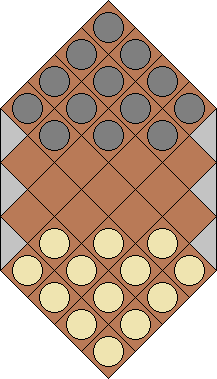
Mike explains... "Here you can move forward orthogonally or diagonally. Obviously it is 100% equivalent with your original setup in terms of gameplay, but I think it gives the game a nice 'ancient' look. Also makes it easier to play with a checkers set." Nice. Thanks Mike. Cool how it worked out with 13 checkers each. |
| DODO CRITIQUES |
Some douche clot on bgg... I forget his name. Splooge or something. Anyway, he says there's "nothing original" about Dodo. NEWSFLASH: A game as simple the hydrogen atom will necessarily be comprised of only a very few generic elements. Kinda like one proton and one electron. The original (and astounding) feature of Dodo is that its incredibly simple rule set gives rise to solid, robust play. Then the clot says let's see five years from now what's being said about Dodo. Ok Splooge. I accept your proposition. Let's fucking see. We can compare it to your game. Oh right! You don't have one! What a colossal asshole. Meanwhile, Michal Zapala, who (unlike Splooge) does have a game people are talking about (Tumbleweed), and whose opinion actually matters, had this to say about Dodo... "I think [Dodo] would be by far the most essential racing game in existence, ... Basically the Hex of racing games." And... "It's just too simple, too pure, it's a total knockout. A game where the standard forward movement is the only constraint, and the final goal is as simple as self-stalemate, simply cannot be beaten." Update: Splooge, the blowhard jackass, who still hasn't played Dodo, is still jabbering on about how it must be Nim-like. This in spite of people who have actually played Dodo reporting that it isn't remotely Nim-like. Now the jackass is trying to defend his idiotic comments with yet more uninformed blather. Here's a quote, just so you can see I'm not making this up... "My snarking remark was my attempt to give the most negative but still objective-sounding criticism I could muster." Go away!! What an ASSHOLE!! I give Splooge a point for not going along with the crowd. That's always commendable. But like minus 100 points for gratuitous assholery. Here's a quote for you, Splooge, written by a well known abstract game designer (me). "If you don't have anything nice to say, SHUT THE HELL UP!!!!" |
| DODO UPDATE |
I don't have any hope of beating the Ludii AI at Dodo it seems. So, just for laughs, I played against the random move generator. Me moving first: Winner Moves to spare Me 0 Me 1 Me 0 Me 1 Rnd 0 Random moving first: Winner Moves to spare Me 5 Me 1 Rnd 0 Me 2 Me 5 Is Dodo opaque? Not how I think of opaque. The first few moves of Gopher are opaque. There's a big open board and nothing to see. Dodo is just the opposite. Opposing armies start mixing it up right away and there's a lot to see. It's too much for my simple mind to process - at this early stage of development at least. Me not being good at a game, especially at first, doesn't speak to the game. It's just par for my course. I don't know how people will react to Dodo. Let's wait and see. I've finished the graphics and started on my Board Game Arena program. It will be harder to program than Gopher because it has 1. A different board orientation for each of the two players. 2. Moving checkers, not just placing them. What Dodo and Gopher have in common: Both extremely simple. Both extremely resistant to first move advantage (judging from the Ludii analysis). That's a rare combination already. Add to that... Both have no need for the pie rule. |
| DODO LUDII APP |
Thanks to Michael Amundsen for programming a Dodo app for Ludii. It's fascinating to watch it play itself. Sometimes White wins. Sometimes Black wins. Sometimes the checkers completely filter through each other. Sometimes they jam up with no pass-through. Many times a player is just on the verge of jamming when a passage suddenly opens. Dodo is a hard game. I don't understand it. It's complex. It's deceptive. |
| DODO |
I won't attempt to characterize the subjective experience of playing Dodo. Like all simple abstracts, it is what it is. As far as tactics, the basic idea is to get all your guys to the opposite end of the board as quick as you can, making directly forward moves. A directly forward move carries your checker twice as far as a diagonally forward move. But you also have to keep narrow channels open for your opponent to slip through so he doesn't get stuck. |
| GOPHER ALMOST KILLED BY WEST WIND |
West Wind (Favonia) contacted me on Board Game Arena. "Hi Mark, I felt I might have figured out a winning strategy for the red player in Gopher of any size. Please let me check more details before coming back to you... "Okay, I checked all the details. I'm planning to create a web page on my website describing the solution. I certainly could not write this down in this textbox without a picture. My next step is to completely characterize *all* the winning/losing starting points. However, if the first player just wants to win the game, there are already 54 starting points that will provably work." I started to write Gopher's apology/farewell letter. Like a politician forced out of office for inappropriate behavior with his assistant, "No! It's a lie! Well, actually, it's true. Sorry." But then, another message blew in from the whispering West Wind. "Too bad I discovered a bug in my argument after the lunch. Sorry for celebrating it too early. But I have an even stronger strategy now, I think..." To West Wind's credit, they are a polite, intelligent person, and an outstanding Gopher player. They are ranked 161 out of 3102 players. My very best players dedicate 18 hours a day to advancing Gopher strategy, but West Wind's Gopher stature is certainly admirable, in the top 5%. I sincerely appreciate their work on a Gopher solution. Gopher is a tempting, but wiley, target. It will live to fight another day. If there is a solution, I want to know. I have a mathematical curiousity about Gopher, and a solution would be crucial. I owe it to Gopher fans to find out about any problems and let them know. Actually I've offered a $200 reward for such a discovery, which reward still stands. The solution would have to work on an even sided board, size six or higher, and must be an automatic win starting from a given set of cells, and an automatic loss starting from any of the remaining cells. In other words, something that can't be repaired with the pie rule, currently deemed unnecessary in Gopher. What I'm looking for here is a "trick". Not some extraordinarily and incomprehensibly complicated algorithm, requiring extensive computation and analysis on every turn. We already have AI solving the size 4 board. So I don't need an algorithmic version of that. But, for the purpose of the reward, if I can comprehend the solution, it will qualify. Of course I'll be a little sad if Gopher is solved, especially after putting a lot of work into programming it and seeing its popularity explode. But it's not like Gopher is my only game. It's not even my best game. But for reasons articulated below, Gopher is wildly popular. |
| GOPHER AT BOARD GAME ARENA |
Huge project. I haven't programmed anything in 235 years (no, not a typo). Big thanks to Sunil Patel for clues to solving project-derailing bugs. He didn't actually write any code, but he gave me hints... like the murderer drove a brown car in London. Not a lot to go on, but sufficient to turn it from mission impossible into mission difficult but doable. I was working on this for like 12 hours a day for the past few weeks. |
| OTHER DESIGNERS |
Michael Amundsen got me going on game design again after an eight year hiatus. He contacted me about Cage to see if his understanding of the rules was correct. Reading the rule sheet didn't refresh my memory. Cage was gone. He asked me to let him know if I were to design any new games, and BOOM. I designed eight games in about as many weeks. Michael play tested all of my games, programmed them for Ludii, added them to BGG, and invested long hours investigating potential problems with Gopher. And... he suggested a change to correct deadlocks in Inchworm. I acknowledged Michael's contribution in the rule sheet (in fine print, lol). Drew Edwards put extensive effort into analyzing Gopher and found a solution on size 5, 7, 9... hexagonal boards. Red starts in the center or a corner. Then, whichever way Blue branches out, Red continues the branch in the same direction. Drew is now mentioned in one of my rule sheets as well. This never used to happen. My take on Gopher? After all of Drew's investigative work, without finding a solution on even sized boards, I don't think it'll happen. If there ever is a "solution", it'll be a combination of a futile attempt to play only on a certain subgrid (or avoid one) and trying not to form losing parity zones. More a set of tactics than a solution. I really appreciate Drew's help though. I'm currently programming Gopher for [unnamed game site; stay tuned...]. Drew's discovery led me to change the board from size 5 to size 6. Now I'm satisfied that I have a super simple game, which is not solvable, and doesn't require the pie rule. And... it's fun. I play Gopher several times a day. A lesser designer, with no appreciation for simple games, cautioned me, "Don't break out the champagne yet." Au contraire. I'm thrilled with Gopher. My ceiling is dimpled from all the cork popping. There are a small number of well wishers, including Alek Erickson, and a long list of naysayers. Christian Freeling doesn't seem to be positive or negative. In discussions of my games, he only ever repeats the same comment. "This is like [insert Christian Freeling game here], because where and if but..." |
| SOFT FINITUDE (CYCLES PART 2) |
Corey Clark contrived a non-finite game in which cycles wouldn't occur: Hex with the option of removing your own stones. The principles I outlined in the Cycles section below still stand. Fact: In Chess, Checkers, and Go (without ko), cycles never occur among beginners but almost always occur among experts. I'm not a mathematician or a game theorist. But I can see that there's a principle at play here. In perfect play of a non-finite game, there are three possibilities. A win for Player 1, a win for Player 2, or a cycle which neither of the players can break without losing. There will be zero or more first moves which guarantee a win for Player 1, zero or more first moves which guarantees a win for Player 2, and zero or more "equitable" moves which leads to a cycle. Maybe in a particular game there are no equitable moves. Every possible first move swings the advantage toward Player 1 or Player 2. I admitted as much in the Cycles section. Just as a general principle, and I've yet to see a non-contrived example to convince me otherwise, there is a tendency toward cycles with increasing skill. The designer's argument that he's seen his game played hundreds of times by any number of beginners and never saw a cycle fails to convince me. I personally played Quadrature around 1000 times with one of my neighbors, before our skill advanced to the point where we had a cycle. I believe that Cycles find a way in normal games. E.g., not a game of 100,000 moves that takes a month of continuous play to complete, not a connection game where players are gratuitously removing their own stones... For me as a designer, finitude is more about architectural aesthetics than potential gameplay issues. Finite games are a solution to a challenging puzzle. They're harder to design. I've had plenty of interesting concepts that I've tossed out because I couldn't find any way to make them finite. The recent trend of designers congratulating themselves for their latest soft finite game, that they've play tested ten times, is malarkey. |
| MY DESIGN APPROACH |
My designs are motivated solely by architecture. I like to make original, unique, and interesting rule sets. Of course if a game turns out to have outstanding gameplay, like Oust or Zola, it's gratifying. Gameplay is just not what drives me. Christian Freeling is the "game whisperer". He can intuit characteristics of a new design's play in advance. I don't have that superpower. And I wouldn't use it even if I did. I see designers congratulating themselves for their ability to analyze a game's hotness, coldness, soft-finitude, and other esoteric qualities... and scientifically determine how much fun it will be to play. To me these discussions seem like malarkey. They usually result in uninspired variants, like Nick Bentley's Blooms (for which he extols his own "brilliance"). I usually, but not always, give my games at least half a run-through to see if deadlocks or cycles can occur. Or, if a design seems like it might be vulnerable to first move advantage, I'll play it until I'm satisfied it's solid. I've tossed out somewhere around a quarter of my designs because problems developed, or because they turned out not to be as original as I thought. Someone already had a similar game. Now if their game is based on yet more similar games, it's not such a problem. But I don't want to run off with anyone else's unique, original work. I'm known for specializing in finite games. Or I guess I should call them "hard-finite" now since the emergence of "soft-finite" discussions. I don't want to take a chance on cycles developing. I don't want you to invest a year advancing your skill in a game that may ultimately fail you. I rule out cycles from the get-go. If cycles can't occur, they won't. I'm often criticized for my devotion to the finite, and for my antipathy toward the player experience. But I do what floats my boat. Not yours. Particular Games I've played a lot of Oust and a fair amount of Zola. There are no other games I'd rather play (except possibly Inchworm). Inchworm, with its natural theme, is unusual and intriguing. I played a lot of Flume. It's a parity/Nim experience, which is not really my forte. But there's something engaging about Flume. Fractal is my favorite connection game. Beautiful to behold. Designed to minimize first move advantage. Gopher is a super simple game. Update: Gopher is an awesome game. It's the only game I like to play currently. I play it several times a day using Michael Amundsen's Ludii script. Rive has an extreme churn rate. Full sized game on a tiny board. Good travel game. Monkey Queen is well thought of. Hex KB, like many of my games, is an interesting concept. |
| CYCLES |
Like when Jeff Goldblum said, "Life finds a way," in Jurassic Park... Cycles find a way. So-called "soft-finite" games may be crappier than claimed. Cycles may not happen in the first 10 or 100 plays. It may take 1000 plays. That's what happened to me with Quadrature. Cycles are a force of nature, like a whirlpool. You don't realize you're caught in one until it's too late. Players can't break out of a cycle without losing. As skill increases, play "tightens". Advantage doesn't flop back and forth with each successive blunder. Expert opponents together chart a course for a distant whirlpool. Good and perfect moves keep them on course. Bad moves divert them. Classic examples of cyclic games are Checkers, Chess, and Go. "But wait," you say. "Go has superko!" - an asinine, oft repeated by otherwise semi-intelligent individuals (Corey). Superko means you're not allowed to repeat a board position. You're saying in essence, "Go doesn't have cycles because you're not allowed to cycle." You could apply that "principle" to any non-finite game. Ko, triple ko, and superko are malarkey. Go - "minute to learn" (rofl). You about need a PhD to understand all the intricacies of Go rules. Beginners may never experience cycles in the three aforementioned classics, but experts are plagued by them. My reasoning is inductive and intuitive. Maybe I'm wrong. Maybe there's a game out there in which cycles can happen but never will because intelligent, competitive play somehow thwarts them. I sincerely doubt it. Not to glorify my own design strategy. I really don't care. It's just my belief. Cycles find a way. For most games we'll never know. There are too many games, and not enough players, for play to become expert enough to find out. But do you really want to invest years of effort, advancing your strategy in a game that may ultimately fail you? |
| COREY CLARK VS OUST |
Corey Clark said, "Hex Oust was really decimated by the strategic ideas of Raph on iggc a decade on (not like it became a bad game but no more 1 stone comebacks)." WHAT?? I played Raph many times and watched him play many times. He was just a super good player whom nobody could beat. Sure, Raph destroyed the 1 stone comeback. And the large group comeback. And every other kind of comeback - against Raph. Raph must have beaten Corey down to his last remaining stone. Corey presumed he could mount a comeback, and instead just lost his last stone. Like the tennis player who hits a bad shot and immediately examines his racket strings, Corey found an explanation for his loss other than his own inferior play. "Yeah, that's it! Oust is coming apart at the seams!" It's not as though Corey gained any insight from playing Raph. Corey continued to be mediocre after Raph left (after Raph got tired of beating everyone and moved on to something else). Corey can today be beaten by a 1 stone comeback. Corey could himself execute a 1 stone comeback - against someone other than Raph. Raph has a high IQ and was able to peer farther into the future than the rest of us. He also undoubtedly developed some tactics that would have been impossible to explain to mere mortals, had he wanted to. There's no shame in acknowledging good players. Most of them couldn't design their way out of a paper bag, and wouldn't want to. They're perfectly content playing what's there. No, the death of the 1 stone comeback has been greatly exaggerated. It's still alive and well - between evenly matched players. I was there. Had Oust developed the slightest problem, I would have known about it. I think Corey got into a patch of bad mushrooms in the Canadian outback. Why else would he go on a flight of fancy and make up something absurd about Oust? If Oust had revealed a flaw, I'd be the first to admit it. Other of my games are flawed. Quadrature, my first game, has what I consider to be a flaw. Move cycles can occur. I found out the hard way, after having played at least a thousand times, and it wasn't fun. Never again would I design another non-finite game. Addendum: Witnessing the interminable flaw-fix cycle of Faust (Fussed?), I think I see the root of Corey's bizarre Oust critique. Faust is fatally flawed. So now Oust, the inspiration for Faust, must also be flawed. Classic post hoc fallacy. Update: Corey claims to have occasionally beaten Raph after Raph's ascendance to Oust supremacy. Show me the replay. I'm having a little trouble with that, lol. |